Sony Sugar resumes operations after crucial maintenance

Tractors deliver cane at Sony Sugar Company. (Inset) the firm's new Managing Director Martine Dima.
State-run Sony Sugar has resumed milling after a two-week closure to carry out factory maintenance.
The Sh300 million exercise is projected to restore efficiency after the factory experienced recurring breakdowns due to ageing machinery and fatigued plant conditions.
Sony Sugar’s Managing Director Martine Dima explained that maintenance was necessary to address critical issues that severely affected the factory’s operations and financial performance.
“The plant’s deteriorating condition made it increasingly challenging to meet critical obligations, leading to significant losses,” Mr Dima said.
The Sony Sugar boss said the mini maintenance will enhance its daily production over the next six months as they plan to embark on comprehensive annual plant maintenance in May 2025 to ensure sustained improvements.
He pointed out that the dilapidated machinery at the Awendo-based sugar factory which resumed operations on Friday 20, December 2024 had not undergone maintenance for the last 24 months and was experiencing an inefficient extraction process.
Immediately after being appointed Sony MD in May this year, Mr Dima prioritised saving resources internally without relying on a government bailout.
Established in 1979, Sony Sugar which operates with a daily crushing capacity of 3,000 tonnes of sugarcane has been prone to wear and tear, leading to frequent disruptions.
While acknowledging the challenges, Mr Dima expressed confidence that the recent maintenance would provide a much-needed lifeline to the miller and the farmers.
“The maintenance efforts aim to stabilise operations and restore confidence among farmers and stakeholders in the region,” he said.
Mr Dima appealed to farmers to increase their acreage of cane to continuously provide raw materials to the company and fully utilise the factory’s capacity.
Sony Sugar has 2,400 hectares of nuclear under cane with an additional 6,000 hectares from contracted farmers.
He pointed out that their payment model of “first in first out” has inspired the confidence of farmers who had abandoned the growing of the primary raw material for other alternatives.
“The company has realised increased volumes of cane by up to 20,000 tonnes per week,” Mr Dima said.





